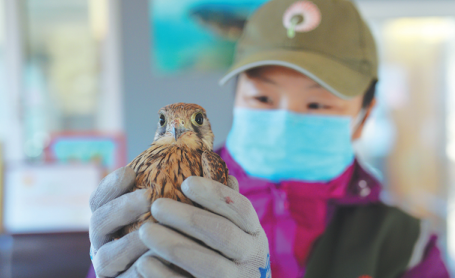Younger generation leads the fight for wildlife protection

 A volunteer at a local wild fauna and flora protection association displays a bird of falco tinnunculus that was rescued recently in Qingdao, Shandong province. WANG HAIBIN/FOR CHINA DAILY
A volunteer at a local wild fauna and flora protection association displays a bird of falco tinnunculus that was rescued recently in Qingdao, Shandong province. WANG HAIBIN/FOR CHINA DAILY
Wu's idea has been increasingly accepted and supported by young celebrities, experts and social workers.
Chinese musical actor Ayanga, who has over 3.1 million followers on the Sina Weibo micro-blogging platform, posted an initiative to "be a self-disciplined youth and not eat wild animals" on Feb 24. The repost received 115,000 upvotes, 20,000 comments and 25,000 reposts from his followers. He posted the initiative again on Feb 27, drawing more popular singers and celebrities to join.
From 2012 to 2018, 30-year-old Liu Meisi worked at Huping Mountain, the largest nature reserve in Hunan province. As a graduate of wildlife and nature reserve management from Southwest Forestry University, she has noticed a growing youth movement in her field.
"There were just two young people when I began to work there, but the number had jumped to over 20 when I left," she says. "The young staffers have become the main force in patrolling the reserve, public education roles and biodiversity survey participation."
Liu is now engaged in nature education in Southwest China's Yunnan province. Every week she takes a dozen students from different schools to go bird-watching near Erhai Lake, while the winter and summer nature camps she organizes attract several dozen families from all over China.
"Young parents are not only more willing to enroll their children in such activities, they sometimes even show more interest when tracking gibbons or observing snub-nosed monkeys," she says.
China's nature education market has expanded rapidly in recent years, which demonstrates the increasing eco-consciousness of society at large, according to Liu.
At the bimonthly session of the National People's Congress Standing Committee on Feb 24, China's top legislature decided to thoroughly ban illegal wildlife trade and eliminate the bad habit of eating wild animals.
Local governments in Fujian, Guangdong and Tianjin have also introduced regulations implementing bans on such activities. Shenzhen has gone even further, issuing a "white list" of only a dozen edible animals, expanding the ban to other non-protected animals.
"It's a very big step for Shenzhen to exclude cats and dogs from the white list," says Qian Yefang, professor at the College of Law and Political Science of Zhejiang Sci-Tech University.
Qian has been paying close attention to animal protection legislation for many years. "The rule of law is the fundamental guarantee for the protection of wildlife and their habitats."
In the coming year, Zhang and her team have planned to introduce a series of courses themed "one-health".
"We'd like to spread the idea of the shared health of people, animals and the environment. I hope more Chinese, especially young people, will hear our voice," Zhang says.




































